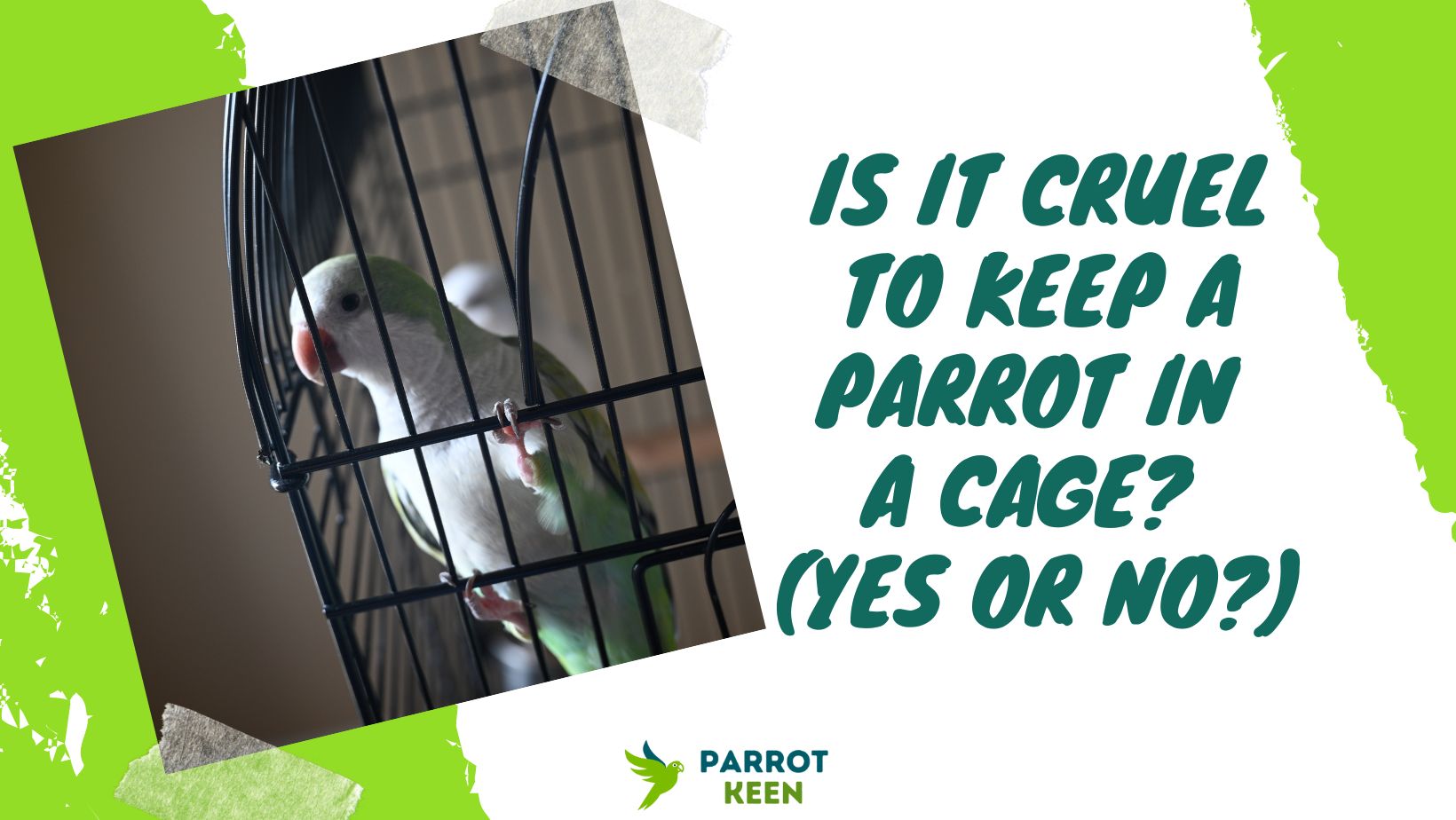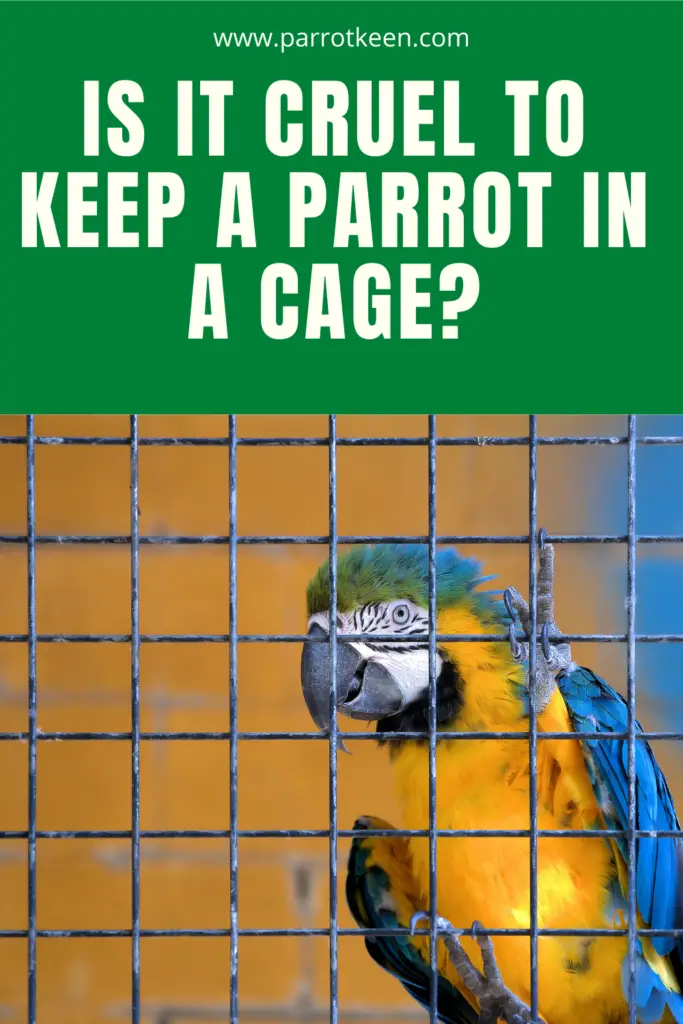
Is It Cruel to Keep a Parrot in a Cage?
There is a lot of debate surrounding the topic of caged birds. Some people believe that keeping a parrot in a cage is cruel, while others argue that it is the only way they can be properly taken care of.
This blog post will explore both sides of the argument and let you decide for yourself.
When you think of a caged animal, what comes to mind?
Probably a bird in a small wire enclosure, right? You may be surprised to learn that this is not always the case. In fact, many parrots thrive when they are kept in cages.
So, is it cruel to keep a parrot in a cage? The answer to that question depends on several factors. Let’s take a closer look at this controversial topic.
Is It Cruel to Keep a Parrot in a Cage?
No, it is not cruel to keep a parrot in a cage. Parrots are very social creatures and thrive on interaction with their human companions. A well-cared-for parrot can live a long and healthy life in a cage.
Of course, there are some things to consider when keeping a parrot in a cage. The size of the cage is important, as parrots need plenty of space to move around and exercise.
The cage should also be furnished with perches, toys, and other objects to keep the parrot occupied and stimulated. The cage should be cleaned and taken care of on a regular basis to maintain the parrot’s health and well-being.
If no one is at home, it is a good idea to put your parrot in the cage or when they are acting up, or it’s time to sleep.
Never leave your parrot in the cage for more than 12 hours at a time, as they need to stretch their wings and move around.
Overall, there is no reason why a parrot cannot live a happy and fulfilling life in a cage as long as the proper care and attention are given.
What Do some animal welfare advocates Say About Keeping Parrots In Cage?
For many people, parrots are the perfect pet. They are intelligent, can be trained to do tricks, and are known for their ability to mimic human speech.
However, some animal welfare advocates argue that keeping a parrot in a cage is cruel. While parrots are able to fly long distances in the wild, they are typically unable to spread their wings in a cage.
In addition, parrots are social creatures that live in large flocks in the wild. In captivity, they may become depressed and withdrawn if they do not have another bird to interact with.
As a result, some experts believe that it is best to only keep parrots as pets if you are prepared to provide them with a spacious cage and plenty of companionships.
Can caged birds survive in the wild?
The answer to this question depends on a number of factors, including the species of bird and the specific circumstances of its release into the wild.
Generally, most caged birds are not well-equipped to survive in the wild. They may not have the necessary skills to find food or shelter, and they may be unable to avoid predators.
Moreover, released birds can pose a threat to native wildlife populations by spreading diseases or competing for resources.
While it is possible for a caged bird to survive in the wild, the likelihood is relatively low. Therefore, it is often best to keep pet birds in captivity where they can be properly cared for.
Can I let my bird fly in the house?
Absolutely not. But if you wish to allow your bird to fly around your house, there are a few things you need to consider before letting your bird fly around the house.
First of all, you need to make sure that your home is safe for your bird. There should be no poisonous plants or chemicals within reach of your bird.
Secondly, you need to ensure that all of your windows are closed and that there are no open flames or moving ceiling fans in the room where your bird will be flying.
Finally, it would help if you always supervise your bird when it is out of its cage. If you follow these guidelines, you can let your bird fly around the house without worry.
Can caged parrots survive in the wild?
It is a big topic of discussion among animal experts, with many different opinions.
So what’s the answer? Unfortunately, there is no clear consensus.
It really depends on the individual bird and its particular circumstances.
Some parrots adapt very well to life in a cage, while others do not.
Many people believe that caged parrots should be set free, but this is not always in the bird’s best interest. While it is true that some captive birds have successfully been released into the wild, this is not always the case.
In many instances, captive parrots lack the skills necessary to survive in the wild, and age and health can also play vital roles. For these reasons, it is important to consult with a qualified professional before releasing a captive bird into the wild.
Whether or not a caged bird can survive in the wild depends on various factors, and it is not always possible to predict the outcome.
However, in general, it is best to err on the side of caution and keep the bird in captivity, even though parrots have the tendency to adapt well to their environment.
Is it good to keep parrots in a cage?
Yes, in our opinion, it is good. Here will look at some advantages of keeping your parrot in a cage.
- Cages offer protection.
They keep your parrot safe from predators and other dangers. Cages can also help prevent injuries if your parrot is prone to flying into walls or other hard surfaces.
Cages offer protection from other birds. If you have more than one bird, it is important to keep them in separate cages to prevent fighting.
Cages also offer protection from household pets. If you have a cat or dog, they may see your parrot as prey. Keeping your bird in a cage will prevent them from being harmed.
- It reduces stress
Parrots can be extremely loud and active. The constant noise can be stressful if you live in a small space, such as an apartment.
Putting your parrot in a cage will help reduce the noise and give you peace.
It can also be stressful for your parrot to be constantly around people. Putting your bird in a cage will give it time if you have a busy household. It will also help your parrot mentally balanced if you give them toys and perches to keep them stimulated.
- Good for the Mind
This is another big pro when it comes to keeping parrots in cages. In the wild, these birds have to forage for food and fly long distances daily. This means that they get a lot of stress. When you keep a parrot in a cage, however, it doesn’t have to work for its food, and it doesn’t have to fly.
While this might sound like it would make the bird bored, it actually has the opposite effect. When a parrot doesn’t have to expend all its energy on getting food and flying, it can focus on other things. This means that it can become smarter when it’s in a cage.
- Avoid Destruction
Some parrots have been reported to chew furniture, cabinets, or eat houseplants. If you have expensive taste or are worried about your home’s appearance, a parrot flying over your house may not be the best thing. Keeping a parrot in a cage will help to avoid any destruction.
Negative Effect Of Keeping Your Parrot In the Cage
I often get asked, “Why should we not keep birds in cages.” Keeping your parrot in a cage for too long can have a negative effect on your bird. Your parrot may become depressed, lonely, anxious, and even aggressive.
Another effect of keeping parrots in cages for long, it can make them suffer from malnutrition if they are not fed properly, and they can be sick from a dirty cage.
Cages that are too small can also cause your parrot to become stressed. So, if you are considering keeping a parrot as a pet, do your research first and provide them with a good home.
How often should you let a parrot out of its cage?
It all boils down to personal preference, says avian veterinarian Dr. Laurie Hess. “Some bird enthusiasts believe that parrots should only be let out of their cages for a few hours a day, while others believe that they should have as much free time outside their cages as possible,” Hess explains.
“There is no right or wrong answer, and ultimately it is up to the pet parent to decide what is best for their bird.”
If you do choose to let your parrot out of its cage, it is recommended that you supervise the bird at all times. Parrots are very curious creatures and can get into a lot of trouble if they are not supervised.
It is also important to make sure that your parrot has a safe place to go back to when it is ready to sleep.
Ultimately, the decision of whether or not to keep a parrot in a cage is a personal one. Both sides have pros and cons, and it is up to the pet parent to decide what is best for their bird.
My neighbor’s pet parrot only goes to the cage when it’s time to sleep at night or when no one is at one. It spends the rest of its time perched on the TV, following anyone who walks by or takes a nap on the arm of the couch.
Is it cruel to keep budgies in cages?
To answer the question, Is it cruel to keep budgies in a cage? No, it’s not cruel to keep budgies in a cage.
However, the choice rests solely on the budgie parent to decide what is best for their cute budgie.
For centuries, humans have kept birds in captivity, and the practice of keeping budgies in cages is no exception.
While some argue that budgies are better off in a cage where they are protected from predators and have access to food and water, others contend that cages deprive budgies of their natural ability to fly and explore.
In addition, budgies are social creatures, and keeping them isolated in a cage can lead to boredom and depression. As a result, whether or not to keep a budgie in a cage is complex, and there is no easy answer.
Ultimately, it is up to the individual bird owner to decide what is best for their pet.
Conclusion: Is It Cruel to Keep a Parrot in a Cage?
Although it is controversial, many people believe that it is cruel to keep a parrot in a cage. Parrots are highly social animals and need to be able to interact with other parrots to thrive.
If you are considering getting a parrot as a pet, please research and ensure that you can provide the bird with the appropriate environment.
Kindly share this article if you find it useful.
PIN IT!


Hi, I am Thersa and Welcome to ParrotKeen, your number one place to get all the information you need about your cute parrot. I hope You Find it useful.
